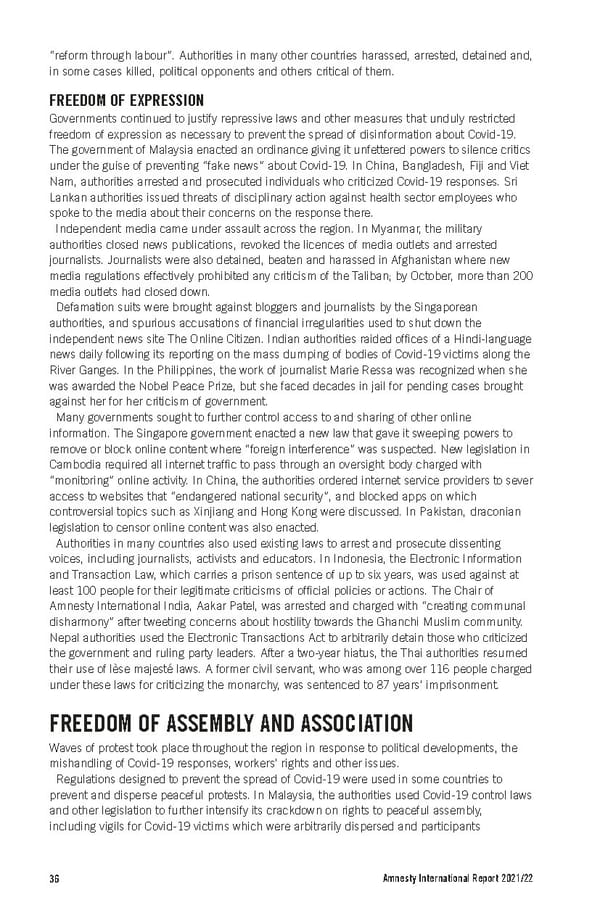“reform through labour”. Authorities in many other countries harassed, arrested, detained and, in some cases killed, political opponents and others critical of them. FREEDOM OF EXPRESSION Governments continued to justify repressive laws and other measures that unduly restricted freedom of expression as necessary to prevent the spread of disinformation about Covid-19. The government of Malaysia enacted an ordinance giving it unfettered powers to silence critics under the guise of preventing “fake news” about Covid-19. In China, Bangladesh, Fiji and Viet Nam, authorities arrested and prosecuted individuals who criticized Covid-19 responses. Sri Lankan authorities issued threats of disciplinary action against health sector employees who spoke to the media about their concerns on the response there. Independent media came under assault across the region. In Myanmar, the military authorities closed news publications, revoked the licences of media outlets and arrested journalists. Journalists were also detained, beaten and harassed in Afghanistan where new media regulations effectively prohibited any criticism of the Taliban; by October, more than 200 media outlets had closed down. Defamation suits were brought against bloggers and journalists by the Singaporean authorities, and spurious accusations of financial irregularities used to shut down the independent news site The Online Citizen. Indian authorities raided offices of a Hindi-language news daily following its reporting on the mass dumping of bodies of Covid-19 victims along the River Ganges. In the Philippines, the work of journalist Marie Ressa was recognized when she was awarded the Nobel Peace Prize, but she faced decades in jail for pending cases brought against her for her criticism of government. Many governments sought to further control access to and sharing of other online information. The Singapore government enacted a new law that gave it sweeping powers to remove or block online content where “foreign interference” was suspected. New legislation in Cambodia required all internet traffic to pass through an oversight body charged with “monitoring” online activity. In China, the authorities ordered internet service providers to sever access to websites that “endangered national security”, and blocked apps on which controversial topics such as Xinjiang and Hong Kong were discussed. In Pakistan, draconian legislation to censor online content was also enacted. Authorities in many countries also used existing laws to arrest and prosecute dissenting voices, including journalists, activists and educators. In Indonesia, the Electronic Information and Transaction Law, which carries a prison sentence of up to six years, was used against at least 100 people for their legitimate criticisms of official policies or actions. The Chair of Amnesty International India, Aakar Patel, was arrested and charged with “creating communal disharmony” after tweeting concerns about hostility towards the Ghanchi Muslim community. Nepal authorities used the Electronic Transactions Act to arbitrarily detain those who criticized the government and ruling party leaders. After a two-year hiatus, the Thai authorities resumed their use of lèse majesté laws. A former civil servant, who was among over 116 people charged under these laws for criticizing the monarchy, was sentenced to 87 years’ imprisonment. FREEDOM OF ASSEMBLY AND ASSOCIATION Waves of protest took place throughout the region in response to political developments, the mishandling of Covid-19 responses, workers’ rights and other issues. Regulations designed to prevent the spread of Covid-19 were used in some countries to prevent and disperse peaceful protests. In Malaysia, the authorities used Covid-19 control laws and other legislation to further intensify its crackdown on rights to peaceful assembly, including vigils for Covid-19 victims which were arbitrarily dispersed and participants Amnesty International Report 2021/22 36
 Amnesty International Report 2021/22 Page 35 Page 37
Amnesty International Report 2021/22 Page 35 Page 37